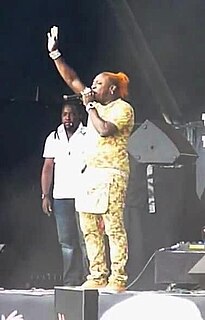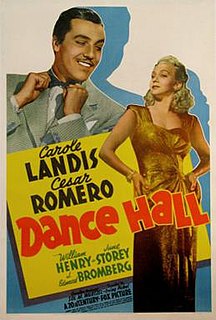Raggamuffin music, usually abbreviated as ragga, is a subgenre of dancehall and reggae music, in which the instrumentation primarily consists of electronic music. Similar to hip hop, sampling often serves a prominent role in raggamuffin music.
Riddim is the Jamaican Patois pronunciation of the English word "rhythm". In reggae, dancehall, calypso, soca, and reggaeton parlance it refers to the instrumental accompaniment to a song. These genres consist of the riddim plus the "voicing" sung by the deejay. The resulting song structure is distinctive in many ways. A given riddim, if popular, may be used in dozens—or even hundreds—of songs, not only in recordings but also in live performances.
The music of Jamaica includes Jamaican folk music and many popular genres, such as mento, ska, rocksteady, reggae, dub music, dancehall, reggae fusion and related styles.
Dancehall is a genre of Jamaican popular music that originated in the late 1970s. Initially, dancehall was a more sparse version of reggae than the roots style, which had dominated much of the 1970s. In the mid-1980s, digital instrumentation became more prevalent, changing the sound considerably, with digital dancehall becoming increasingly characterized by faster rhythms. Key elements of dancehall music include its extensive use of Jamaican Patois rather than Jamaican standard English and a focus on the track instrumentals.
Jamaican culture consists of the religion, norms, values, and lifestyle that define the people of Jamaica. The culture is mixed, with an ethnically diverse society, stemming from a history of inhabitants beginning with the original Taino people. The Spaniards originally brought slavery to Jamaica. Then they were overthrown by the English. Jamaica later gained emancipation on August 1, 1834, and independence from the British on August 6, 1962. Black slaves became the dominant cultural force as they suffered and resisted the harsh conditions of forced labour. After the abolition of slavery, Chinese and Indian migrants were transported to the island as indentured workers, bringing with them ideas from the Far East. These contributions resulted in a diversity that affected the language, music, dance, religion, and social norms and practices of the Jamaicans.

Oneal Bryan, better known by his stage name Elephant Man is a Jamaican dancehall musician and singer.
This article is about the Jamaican reggae producer, for the American hip hop producer, see: RZA
In Jamaican popular culture, a sound system is a group of disc jockeys, engineers and MCs playing ska, rocksteady or reggae music. The sound system is an important part of Jamaican culture and history.

Ky-Mani Marley is a Jamaican reggae and hip-hop artist. His name is of East African origin, and means "Adventurous Traveler". He is the only child of Bob Marley with Anita Belnavis, a Jamaican table tennis champion.
Dance Hall Racket is a 1953 American film directed by Phil Tucker starring Lenny Bruce and his wife Honey Harlow.
The Dutty Wine is an African-Jamaican dance, typically performed by young women. The dance originated in Jamaica as with many other dances like "Log on" and "Screechie". There are several dancers in Jamaica who claim they were its creator, among them a dancehall queen named Mad Michelle who refers to a video recording from 2003. The Dutty Wine was popularized in 2006 via a #1 song of the same name by dancehall artist Tony Matterhorn recorded on the Smash riddim. The name was created in Jamaica.
Reggae fusion is a fusion genre of reggae that mixes reggae or dancehall with other genres, such as pop, rock, R&B, jazz and drum and bass.
Bogle, born Gerald Levy, and also known as Bogle Dancer, Mr Bogle, Father Bogle, and Mr Wacky, was a Jamaican dancehall star, dancer and choreographer. Beenie Man called Bogle "the greatest dancer of all time" and he is recognised as "part of the foundation and as an icon inside of dancehall culture." Bogle created more dancehall moves than any other figure, he is best known for creating the Bogle dance which is named after him. His stage name, Bogle, is a reference to Paul Bogle a National Hero of Jamaica.
Junko Kudo, alias Junko, Junko Bashment or Dancehall Queen Junko, is a Japanese professional dancer, specialising in reggae dance, known internationally in reggae circles as the first foreign "Dancehall Queen".
A Dancehall Queen is a female dancer known in the dancehall scene for her charisma, latest dance moves, and sexy fashion sense. The tradition originated in Jamaican dancehall parties in the ghettos, seeking the best local female dancer. Each Jamaican parish holds a local dancehall queen competition annually, the most popular being the Dancehall Queen competition in Montego Bay.
The Bogle is a dance move originating from Kingston, Jamaica. The dance gets its name from a dancer named Bogle who danced as part of Kingston's Black Roses crew,who was in turn inspired by Barrington Levy.

It's All About Dancing: A Jamaican Dance-U-Mentary is a 2006 Jamaican documentary film that reveals dancehall culture in its truest form. Filmed in the country where dancehall began, the film incorporates the best of the local dancehall selectors, DJ’s and dancers, almost all of whom are native to Jamaica; including Ding Dong, the host of the film. Other star performers featured are Beenie Man, Elephant Man, T.O.K., Mr. Vegas, Voicemail, Macka Diamond, Tanto Metro & Devonte, Tony Matterhorn, Scatta, Richie Feelings, Bogle, John Hype, Ice, Sadiqy & G-Unit, Latisha and Kiyo.




